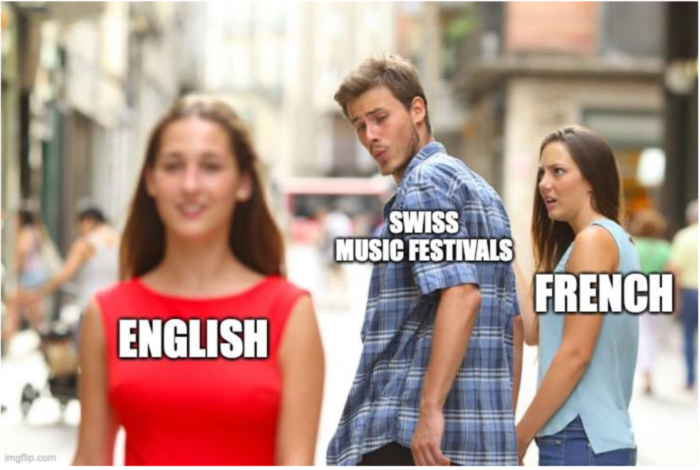Is English taking over the Swiss Music Scene? – Clarissa Paolone
Art/Music
English as a lingua franca has snuck itself into our daily lives, thus also affecting the language practices in many workplaces all over Switzerland. In the world of music, there are plenty of anglicisms that we use on a regular basis: DJ, Hip Hop, Rap, Charts, R’n’B and Jazz, among many others. This study aims at investigating the usage of English during the organization of one of Switzerland’s most famous music festivals. Additionally, I want to find out how important the German language is compared to French and English, whether French has an important role in the communication processes as well, and if this has been subject to change. A total number of eight participants, 5 female and 3 male participants, provided insight on how their language practices in the workplace have changed with the increasing use of English as lingua franca. I conducted an interview with six team members in charge of the organization of the festival, ranging from the CEO to the employees responsible for Ticketing, Artist Relations, Sponsoring and Media Communication. The other two participants that I interviewed are employees of the security firm, who, for many years, have been ensuring the festival’s safety on- and offstage.
Initially, I would like to specify that the festival takes place in the German speaking part of Switzerland. My areas of interest for the team members included the analysis of their English usage in their ‘internal’ communication with the artists and their management, with sponsors and amongst the crew, as well as the ‘external’ communication with guests during the festival and on social media (promotion, interaction with guests etc.). Meanwhile, with the employees of the security firm, my main interest was finding out what languages they are approached with by local and foreign guests, whether the English language is commonly used in the workplace, and if there is a difference between the English and French usage with the guests.
“German and English are required … every other language is nice to have”
The employees of the festival speak multiple languages. All of them speak German and English, and 4 out of six members speak a total of 5-6 languages (including languages such as French, Italian, Spanish, Dutch and Portuguese). Every employee listed German first, followed by English, which implies that the language they are most proficient in, other than German, is indeed English. The importance of the English language can be also seen in the hiring requirements, as a team member pointed out: “German and English are required languages, every other language is nice to have”. Another team member added that French can be beneficial when it comes to the communication with French speaking guests, for instance from the Romandy or France.
What I was intrigued to find, is how often or seldom English is used not only during the event, but also while organizing it, and for what purposes. Starting with the 6 team members, the results display that their English usage depends on the position they hold within the company. During the organization, which takes multiple months after and before the festival, the employees responsible for Media Communication, Ticketing and Sponsoring seldom use English for work. The CEO and the employees responsible for Artist Relations, however, use English daily, while communicating with international artist agencies, clients in meetings, over the phone or e-mail. Generally, amongst each other, as well as with the other employees (from the security department, other helpers etc.) the language they speak is German. What was surprising to see is that the primary language also during the event, with guests etc., is indeed German. I received similar answers from the 2 employees of the security company that I interviewed. During the event, they communicate through headsets, only in German. The languages that the guests from the audience use when they approach them for certain questions, which usually entail common questions regarding the bathrooms and the intermission in between the concerts, is mainly German. Depending on the artist/s of the evening, the language can differ. If it is a Spanish or Italian artist, they get approached in Spanish and Italian respectively. I was also surprised to learn that English, in later years, has become a more important language compared to French, when it comes to the communication with guests and with the artists.
Additionally, I wanted to know what Anglicisms they use during a normal workday. The team members use rather daily terms such as swipen, posten, scrollen, cool, OK, offer, handy and more specific ones such as letter of agreement. Curiously, the security guards named more specific anglicisms, beginning with headset, briefing, crew-shirts, location, backstage, mixer and Front House (which stands for the entrance), all used in the German speaking context. Whenever they have difficulty communicating with other people during work (which seldom happens, based on their experiences), the team members including the security guards, make use of translation apps or rely on communication through hands and feet, but even in the worst case, English has always helped enabling contact between all parties.
In conclusion, my research shows that while English nowadays has a major importance in the Swiss music festival, German remains the primary language. We can observe a decrease in the usage of the French language, which now is seen as an additional language that can be useful if mastered but is not vital for the hiring process. Finally, one of the team members had a wonderful response when asked whether she had any difficulties communicating with clients: “If I confuse any words, I laugh about it. We all make mistakes, the most important thing is to have the courage to try and speak the foreign language, even though it might not sound perfect”, which perfectly sums up how a great professional environment can be ensured when dealing with multiple languages.
by Clarissa Paolone
